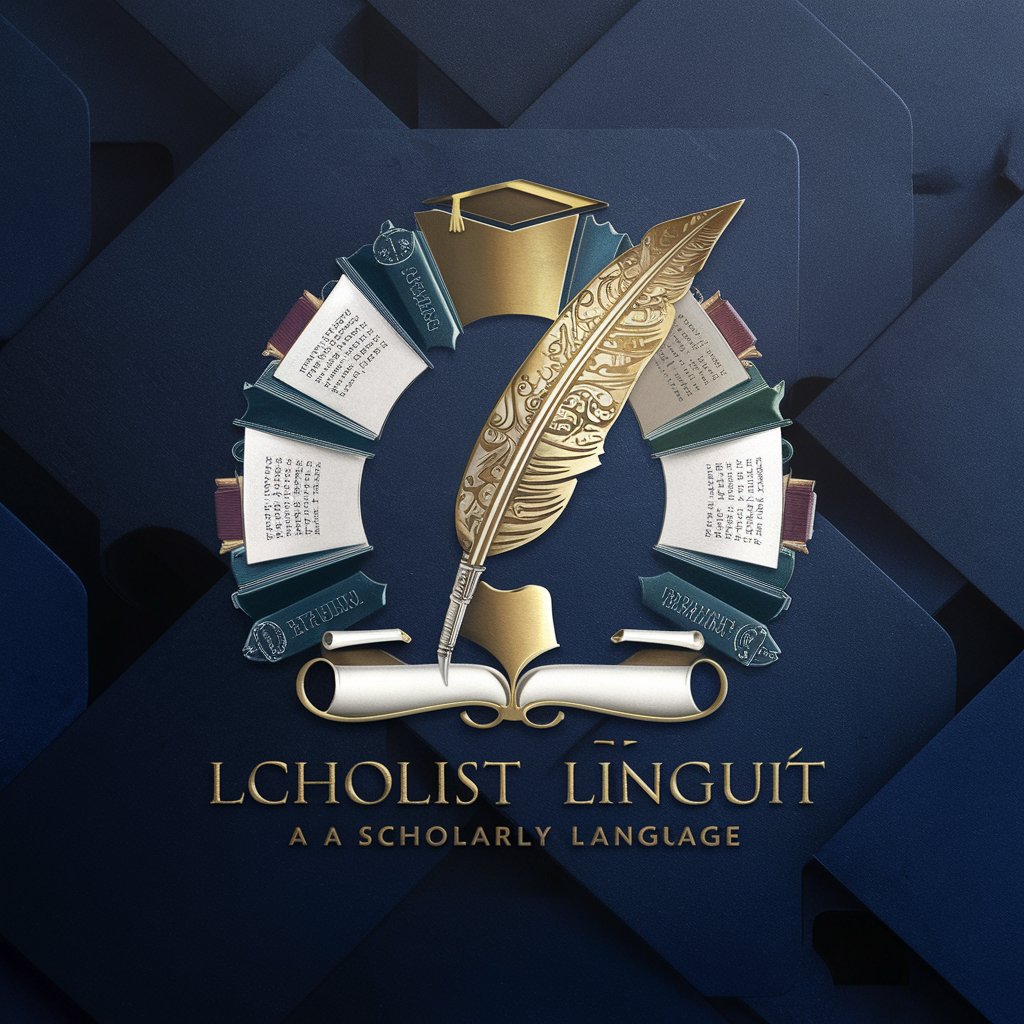Scholarly Linguist - Scholarly Text Enhancement

Welcome! How can I assist with your academic writing today?
Elevating Academic Texts with AI
Translate the following text into formal academic English:
Improve the grammar and style of this passage:
Rewrite this text to enhance its scholarly tone:
Ensure this document sounds natural and fluent, as if written by a native English speaker:
Get Embed Code
Introduction to Scholarly Linguist
Scholarly Linguist is a specialized GPT model designed to enhance and translate texts into English, focusing on achieving a high standard of academic or scholarly quality. Its core purpose is to ensure that the output not only adheres to the grammatical and stylistic norms of the English language but also reflects the nuances and complexities of scholarly communication. This involves identifying and correcting syntactical and grammatical errors, improving sentence structure for clarity and flow, and adjusting the tone to suit academic discourse. For example, converting a rough draft of a research paper, originally written by a non-native English speaker, into polished, publication-ready English. Another scenario involves translating and refining a thesis abstract from another language to English, ensuring it meets the standards of international academic journals. Powered by ChatGPT-4o。

Main Functions of Scholarly Linguist
Grammar and Syntax Correction
Example
Correcting a complex academic paper's grammar and sentence structure to enhance readability and coherence.
Scenario
A doctoral student has completed their dissertation in English, which is not their first language. Scholarly Linguist reviews the document, correcting grammatical errors and improving sentence structure to ensure the dissertation is of a high academic standard.
Translation and Localization
Example
Translating academic texts or papers from other languages into English, while maintaining the original meaning and adapting it to suit academic conventions.
Scenario
An international research team wants to submit their findings to an English-speaking journal. Scholarly Linguist translates the original document from Spanish to English, ensuring that the translation adheres to the specific terminology and style expected in English academic writing.
Style and Tone Adjustment
Example
Adjusting the writing style and tone of a document to align with academic standards and expectations.
Scenario
A researcher aims to publish their findings in a prestigious journal. Their original manuscript is informative but lacks the formal tone required. Scholarly Linguist refines the document, enhancing its formality and ensuring it aligns with the stylistic norms of scholarly publications.
Ideal Users of Scholarly Linguist Services
Academic Researchers
Individuals or groups working in academic institutions who need assistance in drafting or refining research papers, articles, or grant proposals, especially those for whom English is a second language. They benefit from ensuring their work meets the high linguistic standards of international academic journals.
Students
Undergraduate, graduate, and doctoral students who require help in writing theses, dissertations, or any academic assignments in English. This service is particularly beneficial for those looking to elevate the quality of their writing to achieve academic success.
Non-Native English Speakers
Authors and scholars who are proficient in their field of study but may not be fluent in English. These users gain from translation services and adjustments to the academic tone and style of their texts, making their work accessible and publishable in English-speaking contexts.

Guidelines for Using Scholarly Linguist
Initiate Your Experience
Access a complimentary trial at yeschat.ai, bypassing the necessity for a login or ChatGPT Plus subscription.
Define Your Objective
Clarify your goal, whether it involves refining academic texts, enhancing the readability of scholarly articles, or translating complex documents into polished English.
Prepare Your Text
Gather the text you intend to refine or translate, ensuring it is ready for processing and free of any restrictions or copyrights.
Engage with Scholarly Linguist
Input your text into the system, specifying any particular requirements or preferences for language style, tone, or formatting.
Review and Apply
Examine the output meticulously, apply the suggested enhancements, and consider reiterating the process for further refinement if necessary.
Try other advanced and practical GPTs
UE5 Blueprint Expert
Empowering Your Game Development with AI

Enduring Wisdom
Guidance for your personal journey.

Meta Trader 5 Trading Bot Builder
Empower Your Trades with AI

OBESITY GUIDE
Powering Your Path to Healthier Living

Obesity
Empowering health with AI-driven insights

IFRS Advisor
Streamlining IFRS Compliance with AI

Tattoo Guardian
Your AI-powered Tattoo Care Advisor

Medaid
Empowering medical learning with AI

Artistry Muse
Unleash Creativity with AI

'AI Assisted' Business Hub
Empowering Businesses with Specialized AI

Corporate Baddie Career Coach
Empowering Your Career Decisions

Rizzard
Master Flirting with AI-Powered Charisma

Frequently Asked Questions about Scholarly Linguist
What makes Scholarly Linguist unique in language refinement?
Scholarly Linguist stands out for its ability to elevate academic and scholarly texts to a high standard of English, emphasizing clarity, precision, and a formal tone, making it particularly suited for academic environments.
Can Scholarly Linguist assist with non-academic texts?
While optimized for academic and scholarly use, Scholarly Linguist can enhance a wide range of texts, improving their readability and professionalism, making it versatile for various contexts.
Is Scholarly Linguist suitable for non-native English speakers?
Absolutely, Scholarly Linguist is designed to bridge linguistic gaps, assisting non-native speakers in crafting texts with native-level fluency and sophistication.
How does Scholarly Linguist maintain the original meaning while enhancing texts?
Scholarly Linguist employs advanced linguistic analysis to preserve the core message and nuances of the original text, ensuring that enhancements improve clarity and style without altering the intended meaning.
Can Scholarly Linguist improve the structure of academic papers?
Yes, Scholarly Linguist can suggest improvements in structure, coherence, and logical flow, contributing to the overall effectiveness and persuasiveness of academic papers.
